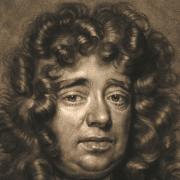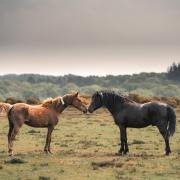Religion was in the family, as it was in most families then; John Keble (1792-1866) was born in Gloucestershire. Aged 15 he was elected a scholar at Corpus Christi, Oxford, so was clearly something of a prodigy. In 1810 he’d take a double first, be elected a fellow of Oriel in 1811 and then the following year won Latin and English prize essays. Impressed? You should be. Come 1815 he’d been ordained a deacon and began working as a curate whilst still living in Oxford where he was college tutor between 1818-23.
As well as being a theologian and academic Keble was a writer, publishing The Christian Year in 1827 whilst his theory of poetry, outlined in the British Critic (1838), was formulated during the Latin lectures he delivered over a decade (1831-41). As someone who once scored 6% in a Latin exam, I am simply awestruck. What I’m wondering, with Christmas approaching, is whether any of Keble’s writings inform us about the festive season or indeed his attitude towards it. I’ll return to that thought.

Keble attracted a small coterie of disciples, including R. Hurrell Froude, and from this band of merry bods launched the Tractarian or Oxford Movement. When he preached a sermon on National Apostasy on July 14, 1833, Keble lit the fuse, initiating eight years of action in which he collaborated with J.H. Newman, Dr. E.B. Pusey, I. Williams, etc, in conjuring Tracts for the Times which was concluded by Tract No. 90 (1841), hence Tractarian. The Oxford Movement, highly influential between 1833-45, was orchestrated by this collection of Oxford scholars who rejected Protestant Anglicanism in favour of a pre-Reformation Catholic version. It was a controversial move that would see Newman go the whole hog and defect to the Roman Catholic church. Keble remained staunchly Anglican, albeit Catholicised; he probably didn’t anticipate Newman hopping over the wall. With Pusey, Keble was the church’s steadying force, supporting it against the shock waves caused by Newman’s defection.
Keble’s writings meanwhile inevitably mention Christmas quite a bit as he understandably dwelt on the coming of Christ the Lord, telling the story in a manner evoking the nativity play that will form part of the build up for many familial Christmases this year: ‘Wrapped in his swaddling bands, and in his manger laid, the hope and glory of all lands is come to the world’s aid: No peaceful home upon his cradle smiled, guests rudely went and came, where slept the royal child’ (Christmas Day, from The Christian Year). I like the ‘rude guests’ bit as the unwanted guest or the one who outstays their welcome is as assuredly part of today’s Christmas as pud and presents. Keble also offers us the preferred climatic mood, the ‘deep and crisp and even’ stuff: ‘All through the wintry heaven and chill night air’. There’s nothing worse than a damp, soggy Christmas. ‘Deep and crisp’ comes from ‘Good King Wenceslas’ of course. Wenceslas looked out on the Feast of Stephen, a.k.a. Boxing Day and Keble gave us St Stephen’s Day in The Christian Year. Boxing Day is just another bank holiday to us, the day we eat the leftovers, walk off the gargantuan meal of the previous day, join big crowds at bank holiday footie and possibly contemplate returning to work. We probably don’t consider the day’s original meaning, commemorating Saint Stephen, the first Christian martyr, but Keble did: ‘The holy Stephen kneels, with stedfast (sic) gaze’. Keble wrote about Christmas when Christianity was still central.


Keble married Charlotte Clarke in 1835 and headed for Hursley in Hampshire where he took up the living in 1836, remaining there until his death 30 years later. Over 500 feet up in the Downs, Keble was a bit closer to his maker in this elevated spot. West of Winchester, it has pretty cottages, some of Tudor vintage, and with distinctive, towering chimneys. It’s the kind of place Christmas can be celebrated in a homely way yet with community at its heart, a place of church and pub, and dwellings taking us back to Keble’s time. Keble is undoubtedly the village’s most famous son who orchestrated the total rebuilding of the parish church, except for its tower, in 1848.
With the December bank holiday over for us Keble moved on to the First Sunday After Christmas with thoughts of what lay ahead: ‘Bright hopes, that erst the bosom warmed, and vows, too pure to be performed, and prayers blown wide’. Yes, I guess it’s a time for hopes, vows (resolutions perhaps) and even prayers for a better world. The whole season nowadays is considered one for family, for enjoyment, particularly for youngsters, and for ending the year with a blow-out. It’s not a universally happy time of course. It should also be a time for thinking of others, those less fortunate perhaps, something Keble encapsulates in the same poem: ‘And overflow this heart of mine, enlarging as it fills with Thee, till in one blaze of charity care and remorse are lost’. It’s a truism that if you do someone a good turn, or perform some charitable act, it makes you feel better about yourself, to the point you forget your own concerns. Keble’s poetry takes us through the whole Christmas-tide experience, from Advent, the season leading to Christmas, to Christmas itself, to Epiphany on January 6, which brings the curtain down on the season.

His writings may talk of Christmas past rather than Christmas present but there are still relevant messages there and musical poetry we can enjoy. John Keble died on March 29, 1866, just shy of his 74th birthday. He was buried in the churchyard in Hursley whilst Keble College, Oxford was established in his memory (1870). If the Oxford Movement tells us one thing it’s that Keble wasn’t one for the status quo; if he could transport himself to 2023 I like to think he’d pour himself a sherry, tuck into a mince pie and watch some repeats on the tele. Happy Christmas all.

CHRONOLOGY
1792 – John Keble born in Fairford, Gloucestershire (April 25).
1811 – Becomes a fellow of Oriel. Keble’s fellow Tractarians were also Oriel men.
1827 – Publication of Keble’s magnum opus, The Christian Year.
1833 – Keble launches the Oxford Movement with his sermon on National Apostasy.
1835 – Keble marries Charlotte Clarke and moves to Hursley in Hampshire.
1848 – Hursley’s parish church is rebuilt by Keble with the exception of its tower.
1866 – Death of John Keble in Bournemouth, then in Hampshire (March 29) aged 73.
1870 – Keble College, Oxford established in John Keble’s memory.



























